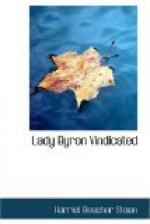When she was introduced to him, and perceived his admiration of herself, and at last received his offer, although deeply moved, she doubted her own power to be to him all that a wife should be. She declined his offer, therefore, but desired to retain his friendship. After this, as she said, a correspondence ensued, mostly on moral and literary subjects; and, by this correspondence, her interest in him was constantly increased.
At last, she said, he sent her a very beautiful letter, offering himself again. ‘I thought,’ she added, ’that it was sincere, and that I might now show him all I felt. I wrote just what was in my heart.
‘Afterwards,’ she said, ’I found in one of his journals this notice of my letter: “A letter from Bell,—never rains but it pours."’
There was through her habitual calm a shade of womanly indignation as she spoke these words; but it was gone in a moment. I said, ’And did he not love you, then?’ She answered, ‘No, my dear: he did not love me.’
‘Why, then, did he wish to marry you?’ She laid her hand on mine, and said in a low voice, ‘You will see.’
She then told me, that, shortly after the declared engagement, he came to her father’s house to visit her as an accepted suitor. The visit was to her full of disappointment. His appearance was so strange, moody, and unaccountable, and his treatment of her so peculiar, that she came to the conclusion that he did not love her, and sought an opportunity to converse with him alone.
She told him that she saw from his manner that their engagement did not give him pleasure; that she should never blame him if he wished to dissolve it; that his nature was exceptional; and if, on a nearer view of the situation, he shrank from it, she would release him, and remain no less than ever his friend.
Upon this, she said, he fainted entirely away.
She stopped a moment, and then, as if speaking with great effort, added, ‘Then I was sure he must love me.’
‘And did he not?’ said I. ’What other cause could have led to this emotion?’
She looked at me very sadly, and said, ‘Fear of detection.’
‘What!’ said I, ‘did that cause then exist?’
‘Yes,’ she said, ‘it did.’ And she explained that she now attributed Lord Byron’s great agitation to fear, that, in some way, suspicion of the crime had been aroused in her mind, and that on this account she was seeking to break the engagement. She said, that, from that moment, her sympathies were aroused for him, to soothe the remorse and anguish which seemed preying on his mind, and which she then regarded as the sensibility of an unusually exacting moral nature, which judged itself by higher standards, and condemned itself unsparingly for what most young men of his times regarded as venial faults. She had every hope for his future, and all the enthusiasm of belief that so many men and women of those times




